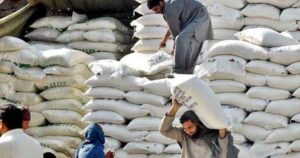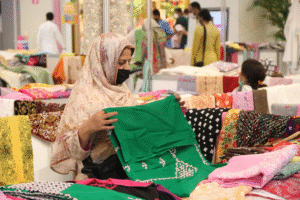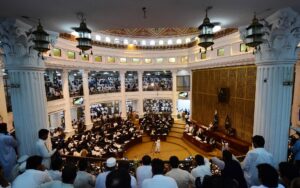Plastic pollution in Pakistan is now reaching critical levels, threatening the environment, public health, and the country’s future. Across the cities of Pakistan, from the bustling streets of Lahore to the shores of Karachi, plastic waste has become an inescapable part of the landscape.
Pakistan produces around 20 million tons of solid waste annually, with about 60 percent of that being plastic. This growing tide of plastic is choking rivers, piling up in landfills, and littering the countryside.
Despite some governmental efforts to address the issue, the scale of plastic pollution in Pakistan continues to expand.Sherry Rehman, former Pakistan’s Federal Minister for Climate Change, recently drew attention to the severity of the problem, comparing the volume of the nation’ plastic waste to the size of two towering peaks, as tall as K2. “If we don’t take immediate action, by 2040, the amount of plastic waste in the country could skyrocket to 12 million tons annually,” she warned.
Also read:
KP Invests Rs203bn in 413 Eco-Friendly Projects Over Eight Years
A Culture of Disposable Convenience
The roots of plastic pollution in Pakistan lie deep in a growing culture of disposable convenience. Dr. Farzana Altaf, Director General of Pakistan’s Environmental Protection Agency, notes how public behavior has shifted over time. “In the past, people carried cloth bags when they went shopping. Now, plastic has become so ingrained in daily life that no one gives a second thought to the environmental impact,” she says.
Plastic bags are handed out freely at markets and shops, adding to the ever-growing waste problem. While the government introduced a ban on plastic bags in 2019, enforcement has been weak, and the alternatives have been slow to take hold. This has allowed plastic pollution in Pakistan to continue growing unchecked, even in the face of mounting environmental challenges.
Also read:
Ahsan Iqbal says Climate Change poses critical threat to Pakistan
Weak Infrastructure and Public Attitudes
The lack of a robust waste management system in Pakistan has compounded the problem. Most plastic waste never reaches recycling facilities and instead ends up in open dumps, where it can take centuries to degrade. This not only contributes to plastic pollution in Pakistan but also poses serious risks to public health and the environment.
“Legislation alone isn’t enough,” says an environmental expert from the Sustainable Participatory Organization, a non-governmental group based in Islamabad. “What we need is a major shift in public attitudes. The government can pass laws, but unless people start taking responsibility for their plastic use, the problem will persist.”
Collective Action is Crucial
Experts argue that tackling plastic pollution in Pakistan will require a coordinated effort from the government, the private sector, and the public. Initiatives to promote eco-friendly alternatives such as reusable cloth bags, glass bottles, and biodegradable packaging are beginning to gain traction, but far more needs to be done to reverse the trend.
Children scavenging for recyclable plastic bottles provide a glimpse of hope, but their efforts alone cannot solve the larger issue. A nationwide recycling program, paired with strong public awareness campaigns, could help Pakistan turn its plastic crisis into an opportunity.
The key, experts say, is for society to recognize the scale of the threat and act before it’s too late.As plastic pollution in Pakistan continues to grow, the country faces an uphill battle. Without urgent action, the environmental damage will only escalate, leaving future generations to deal with the consequences of today’s convenience-driven culture. But with the right policies, public awareness, and a commitment to sustainability, there is still hope to stem the tide of plastic waste.












